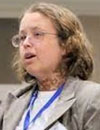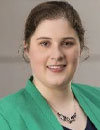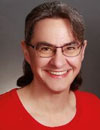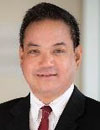The COVID-19 pandemic has changed how people access healthcare. Telehealth and house call visits are two approaches that have helped people with disabilities access health care while avoiding the challenges of leaving their home for healthcare. In this webinar, people with lived experience of disability will interview a panel of physicians on the most person-centered ways of delivering healthcare to people with disabilities. The webinar will include tips for patients, their families, and healthcare providers on how to make the best of telehealth or home visit opportunities where they exist. Panelists will share examples from existing programs, reflect on their experiences and challenges, outline best practices, and identify strategies to ensure culturally responsive practices and equitable opportunities for access to person-centered healthcare through telehealth or home visits.

Nicole LeBlanc has a keen ability and interest in public policy and excels at communicating the needs of people with developmental disabilities to public officials. Nicole is a natural leader chosen by her peers due to her unwavering commitment to speaking the truth to power. She currently works as the Person-Centered Advisory and Leadership Group (PAL) coordinator for NCAPPS. Her motto is “control your own destiny, or someone else will.”

Sarah Blahovec is a disability rights advocate and activist. She currently works as the Voting and Civic Engagement Director for the National Council on Independent Living, where she advocates for greater accessibility in elections; educates the disability community on voting rights and works to energize a disability voting bloc; and addresses barriers to running for office for people with disabilities. Sarah is the creator of Elevate: Campaign Training or People with Disabilities, the first national run for office training program for people with disabilities.

Dr. Clarissa Kripke is Clinical Professor of Family and Community Medicine at the University of California San Francisco. She directs the Office of Developmental Primary Care whose mission is to build the capacity of the healthcare system to serve transition age youth and adults with developmental disabilities through clinical service, advocacy, research, and training. She is the primary care physician for some of the Bay Area’s most medically fragile and behaviorally complex people with developmental disabilities.

Dr. Vincent Siasoco is a Family Physician. He’s an Assistant Professor in the Department of Family Medicine and Pediatrics at the Albert Einstein College of Medicine and Director of Primary Care at the Rose F. Kennedy Children’s Evaluation and Rehabilitation Center at Montefiore Medical Center. He’s the Medical Director at ADAPT Community Network (formally known as United Cerebral Palsy of NYC). He’s a Board member of the American Academy of Developmental Medicine and Dentistry and Clinical Director for Special Olympics.

Robert A. Baldor, MD is a Professor and the Founding Chair of the UMass/Chan Medical School-Baystate Department of Family Medicine. Dr. Baldor has served in number of leadership roles, including the Medical Director for the Center for Developmental Disabilities Evaluation and Research at the UMass/Eunice Kennedy Shriver Center. He is the editor for The ABFM Family Medicine Board Review and an assistant editor for the 5-Minute Clinical Consult.

Tawara Goode is an associate professor and Director of the Georgetown University National Center for Cultural Competence and the Georgetown University Center for Excellence in Developmental Disabilities. Both centers are committed to advancing equity and the mission of the NCCC has a specific focus: To increase the capacity of health care and mental health care programs to design, implement, and evaluate culturally and linguistically competent service delivery systems to address growing diversity, persistent disparities, and to promote health and mental health equity.
Resources:
NCAPPS is an initiative from the Administration for Community Living and the Centers for Medicare & Medicaid Services to help States, Tribes, and Territories to implement person-centered practices. NCAPPS webinars are open to the public, and are geared toward human services administrators, providers, and people who use long-term services and supports. All NCAPPS webinars will be recorded and archived at https://ncapps.acl.gov.